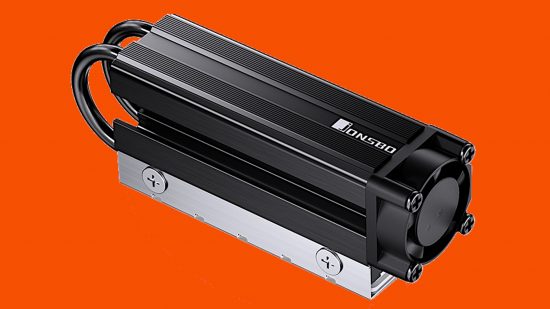Where once a passive SSD heatsink would keep your PCIe solid-state drive sufficiently cool, PCIe 5.0 speeds have forced manufacturers to rethink their cooling strategies. While most SSD makers have opted to include obscenely large coolers with their drives to combat this issue, Jonsbo is turning to a smaller, speedier, but potentially strident cooling system.
Of all the best SSDs on the market, only one uses active cooling, namely the Corsair MP700 Pro. While this makes it a maverick among its PCIe 5.0 peers, it does keep a cool head even under stress. In my testing, I’ve observed would-be speedy solid-state drives massively throttle their performance as their passive heatsinks simply can’t keep them cool. Now, with Jonsbo producing a third-party cooler with an astonishingly fast fan, such problems could become a thing of the past.
Dubbed the M.27, this SSD heatsink is made from aluminum alloy and packs dual heat pipes and thermal pads that cover both sides of the drive. Its most notable feature, though, is its fan which spins at a staggering 10,000 rotations-per-minute (rpm), or 167 times a second.
As anyone who’s configured fan curves will know, though, a higher speed naturally incurs more noise. Jonsbo claims, however, that the M.27 will top out at a surprisingly reasonable 25.9db, which is whisper-quiet territory. Whether the pitch of the fan proves to be problematic, though, remains to be seen, as high-pitched noises can prove thoroughly annoying to human ears.
There’s no word on when or where Jonsbo plans to launch the M.27, nor how much it will cost, but we presume that it will be a fairly premium product given its specs. Still, with the likes of the Crucial T705 proving unruly, it might be worth holding off upgrading to PCIe 5.0 storage until third-party heatsinks such as this one become much more common.
For gaming, though, PCIe 4.0 is plenty fast enough, and we strongly recommend checking out our WD Black SN850X review if you’re in the market a storage upgrade. Despite its age, it remains our favorite SSD to date.
